- Home
- Chris Wraight
The Lords of Silence Page 6
The Lords of Silence Read online
Page 6
Vorx considers that as he sits back in the lander. Like all vehicles of his Legion, it is a bastardised version of a standard Imperial design – heavy, pocked, battle-worn. Mucus slithers down the interior of the viewport. Centipedes writhe in the corners of the chamber, their backs palpitating with a blotch of lurid colouration.
Vorx is one of the few left that knows the name of this planet, and what it meant to those who christened it. All planets in the Eye of Terror have names given them by the eldar. The words are figurative and allegorical, twisting with the many meanings that are only possible in that treacherous xenos tongue. Eliathada does mean ‘sublime soul garden’, but it also means ‘prideful wasteland’, and also ‘dry valley of dreams’. Vorx admires the way a single word can have so many interpretations. When he was in his mortal youth, he hated xenos with a passion driven by his training and his bioengineering, and would not have appreciated the subtlety. Now that so many centuries have passed, and he has become so much less ignorant, he finds that he no longer hates anything very much. That is one of the Gifts of the god, he knows.
He does not know, however, why Mortarion chose this place to make his own. Perhaps the primarch desired something pure to corrupt. Or perhaps he liked the name, harking back as it does to the greater garden, the One True Garden, and saw some kind of fateful resonance there.
From orbit, it is green, as verdant now as old Terra must have been at the dawn of time. It is an emerald in the void, spinning slowly amid a sky of violet and vermillion. Every colour on the face of the world is ramped up, distilled and intensified. Some of its colours do not exist in the purely physical universe at all and have names only the daemons can pronounce. From a distance, Eliathada shines like a lantern in the dark.
Nor does Vorx know why Mortarion never renamed it. The primarch, it is true, has an exaggerated interest in names, bordering on obsession. Since the great shame of the flight from Terra, in which the entire Legion was harried and humiliated and nearly broken apart, that obsession has only grown. It was said that even during the Crusade, before the primarch obtained his daemonhood and became something little less than a god himself, those relentless superstitions were already making their presence felt. That was in the days before the Destroyer Hive, of course, while the Death Guard still resisted becoming what they were always destined to be. Now that they are on the other side of that transition, like moths squirming out of the chrysalis, it is interesting to see how much has been retained.
So the world was never renamed. Those who were driven there in ignominy barely referred to it at all, thinking their retreat would be temporary. Even when that dream faded, and the Manse began to grow and stretch out permanent roots, they never reached for some Barbaran label or other to give a sense of solidity to their endeavour.
It was left to others to call it the Plague Planet, mostly in mockery or fear. The hateful Thousand Sons, those arrogant and deluded tricksters, were the probable origin, for they had carried over their ancestral distaste of all things earthy and honest.
Vorx despises the Thousand Sons more than he despises any citizen of the Imperium. In fact, he reserves mostly affection for the remaining defenders of Terra, seeing them as ignorant and waiting for salvation, but he cannot forgive the sins of Magnus’ progeny, for they should have known what they were doing. Even in their folly and destruction they have persisted in being a Legion of, as Garstag puts it, ‘arrogant shit-stained bastards’. Still, in all likelihood it was they that coined the name, which the planet’s new residents eventually took up themselves in a kind of defiance.
The Plague Planet it has remained ever since, even in the annals of the Imperial Inquisition, who speculate on what such a world must be like from the scraps and snippets they glean here and there.
Vorx smiles. They can have no idea.
It is Vorx’s belief that there are only a dozen – perhaps two dozen – planets in the galaxy truly worth a damn. Terra, incomparable Terra, bauble of every war that humanity has ever fought, is one of them. Mars is close behind. Barbarus most assuredly wasn’t, and it’s very much for the best that it’s been consigned to ashes. Soon the list gets harder to add to.
Until you get to the Plague Planet. Now, then, here is a rock a warrior could die for.
The lander plunges down to cloud level, and Vorx sees the familiar patterns of glow and diffusion. The entire globe is swathed in that humid cover, constantly changing, morphing, discharging and replenishing. The lander penetrates the outer level, and for a few moments the descent becomes rocky. Vorx relaxes, knowing that the transition is brief. Mortarion has generated those clouds to keep his realm shrouded from the rest of the Eye. The primarch ensures that they remain unbroken, lit from below by the exercise of his forges and his devilish manufactoria. Those clouds are the most profound poison, concentrated toxicity, capable of dissolving entire starships if the whim of the god directs it, and only the Legion’s own transports traverse it unscathed.
The lander breaks through, and the hidden surface of the world below slides into view. When the Death Guard first arrived here, it was a formless sphere, studded with eldritch ruins and haunted by the thin voices of xenos ghosts. The ghosts are gone now, for that species of indulgent semi-death is not tolerated in this place of dark fecundity. In its place, mountains have been raised. They are not natural. Their sides, glistening with cultivated slimes, are too steep, too dark, to have been formed by tectonics or erosion. They are pillars of extravagance, thrust up from alien soil by spine-bending labour and the injunctions of sorcery. Over ten thousand years, the pinnacles have pushed higher and steeper, crowding up against one another, until the entire planet’s crust resembles a giant porcupine skin, the valleys glowing with vivid green fire, the peaks as black as the souls of their creators.
Every inch of ground below is riddled with the tunnels of an immeasurably vast army, once baseline human, now a variety of sub-species steadily ground down and remade into the image of beasts. They drudge in the toxin-thick chasms, hauling raw materials for new spires of filth, sustained only by remorseless faith and the raw flesh of their own dead. They suck in spore-rich air, making their mutations gradually more flamboyant, and tread the old roads with packs on their misshapen backs. As the galaxy ages, those tracks have been worn away ever deeper, driving further into the crust of the world even as the cliffs above them pile higher.
Atop each of those cliffs stand great fortresses, the least of them a rival for the greatest fastnesses of the Imperium. Green aurorae flicker across parapets of black iron, briefly exposing the steep-angled profile of giant artillery ranks. Daemon engines prowl the ramparts, their exhausts gouting black slurry. Immense shroud creatures swim in the sulphurous heavens, trailing long cloaks riddled with mould. Rib-thin campaniles toll endlessly in discordant monotony, their dull iron-cast bells hammered by teams of bestials to mark the creation of fresh joys and miseries.
Deep down, buried within the world’s unquiet mantle, are the fabled networks of laboratories, apothecarions, fermentation chambers, brew cauldrons and rot pits. They merge into one another, blending into a twilight world of steam and toil so that not one living soul, perhaps not even the Deathlord himself, knows their full extent.
Spiralling chimneys vomit smoke every hour, adding to the inky, gravid clouds that swim across the bio-industrial landscape. Rain falls in thick torrents, cascading down the steep fortress sides and washing filth back down to the base of the chasms. Bacteria burst and divide in those cataracts, breeding voraciously in the humid depths before flowering in new and esoteric forms once the dim green sunlight filters back through the murk.
Vorx casts his jaded eyes across the vista and feels his old soul rejoice. The Plague Planet is the lodestone of his people, the crucible in which their blessed Gifts are developed. They inherited a dust-dry morgue and turned it into a vista of magnificence. This is a vindication of their esoteric creed, of the belief that through entropy co
mes apotheosis, of the wholehearted embrace of mortality in all its truest and most honest aspects.
The lander is shaking down, buffeted by moisture-heavy winds. The far horizon is lit by sooty pyres, and Vorx sees a mighty daemonship rise up slowly from a cradle of rusting spines. Even within the controlled atmosphere of the lander he can taste the many and wonderful pheromones that only exist here. He hears the boom and roll of drums, the braying of indentured herds, the background drone of a quadrillion flies, all directed towards one glorious end.
Evangelism.
This place is the mother church, the incubator for every bio-creed and flesh catechism, the pregnant source, the fertile seed. It is all for dissemination elsewhere. The Legion will only rest when all planets are Plague Planets, and the bells toll out across a galaxy made into this image of spectacular decay. They are the willing disciples, cast adrift in a cold and insipid universe. For a long time they have been working alone, driven onwards only by internal commitment and orders so old they could have been ossified before the age of the Doomed Warmaster. There was no word from the primarch himself, who was said to spend his days in his mouldering scriptorium. The Legion held together during that time, although it has frayed at the edges, some tempted to cleave their own path, others drawn by the siren call of the Despoiler. That was always a regret to Vorx, who has not heard the voice of his primarch for many centuries.
But there is change in the air now. The plagues taste a little different. The chime of the bells has a strange timbre. Even the bestials sense it, and they lift their elongated faces to the seamy heights.
The lander reaches its destination – a raised scaffold draped with black vines, half-hidden behind the miasma of forgesmoke. Waiting around the receiving platform’s perimeter are a variegated collection of the Plague Planet’s denizens – bestials wearing corroded metal plates and long rags, priests of the god in threadbare robes, several carrying great bells dangling atop heavy staffs. One of them, by his stature, is clearly Unbroken, but he does not wear his armour. His fleshy, mould-black body is barely contained by iron-thread mail. His sallow head, riddled with blotches that indicate some blood contagion, pokes stalk-like from a moth-eaten fur mantle. His eyes bleed softly with pale green light, and when he opens his tooth-spare mouth, the same light spills from between grey gums. He leans on a knotted length of wood, itself made seemingly fragile by the gnawed tunnels of borers, but which has somehow endured for as long as the war has.
Not everyone knows the name of that staff, either. Vorx, who studies all such things, knows that it is Wyrmwold, the last sliver of living matter taken from Barbarus and invested with all that world’s spite and futility. Everything else was destroyed, but this final splinter is still clutched tight in claw-like hands. It is a relic. The reasons for keeping it, beyond sentiment, are unclear.
Vorx descends the ramp and bows before the staff-bearer. ‘Slivergristle,’ he says reverently.
Slivergristle is a curiosity. He was once Kregar, a Plague Marine who fought in the Great Crusade. Like the rest of them, he endured the defeat under Terra’s vertiginous battlements and fought all the way back to the shameful Eye. Unlike most, he did not remain locked in that prison, but found some means to slip out before the bounds were fully set. He travelled to Barbarus, where he managed to retrieve Wyrmwold before the virus bombs fell.
Then something changed in him. He travelled strange paths – some say beyond the Halo Stars and into the deepest dark – and when he returned, he told even stranger stories. His speech had become as warped as his body, and it was reported that pacts had been made in the daemonic choirs to consume his essence as the result of an unspecified slight or prideful action. That was never proven, not even by the greatest priests of the god, but something had definitely taken place, for Slivergristle cast off his armour, took up the threadbare cloak of a pilgrim and never left the Plague Planet again.
‘I am an eater of the Neverborn,’ he told any who asked. That, too, is unproven, and yet Vorx believes it. He believes that Slivergristle has been possessed more than once, but that his ague-shot body treats trapped intelligences as one more infection among the hundreds of others, and is thus able to dissolve them. Vorx further speculates that the youngest and most foolish of the daemonic choir see this as a challenge and jostle for access to this most eccentric of hosts, hoping to master him and claim his soul. One by one they have all been digested, leading to little more than corposant-lit halitosis.
Such are the stories told of Slivergristle. Whether they have any basis in truth is doubtful, though his favour rides high among the many competing vicars of the Plague Planet.
‘Siegemaster,’ says Slivergristle, and wisps of ghost-light snag at the corners of his mouth. ‘Home to welcome. Travels? Good.’
They were. Vorx’s warband, the Lords of Silence, have been enjoying the favour of the god. The Imperium is becoming less able to prevent their sallies from the slowly breaking gaol of the Eye, and so they have feasted on worlds.
‘The reaping continues,’ he says, in a polite formula.
They walk together towards the platform’s edge. In the distant darkness, Vorx can hear lowing from the ritual abattoirs. He smells the richness of the mote-riddled air. He sees the green-tinged aurorae ripple across the jagged skyscape of spoil-spires.
‘Aware you indeed the tidings of, yes?’ asks Slivergristle.
‘I have heard things,’ says Vorx. ‘Here and there.’
‘True. Of it all, true and in that.’ Slivergristle belches, and a puff of short-lived flame whispers in the darkness. ‘So sceptical, no, I would not so listen. Called back in a reason, yes. Lives he.’
‘I know the primarch lives, brother vicar,’ says Vorx.
‘No, lives he. Blood now boiling, just old like again it.’
These rumours were known about. Word had passed across warbands like the diseases they revelled in, somehow leaping across the immense gulf of the void to be half heard and copied and doubted. That was, after all, why Vorx had come back. There were a thousand reasons for daring the treacherous shoals of the Eye’s borders again, not least the close pursuit of more than one Chapter of the Adeptus Astartes, but that was the choicest of all – that he might be roused again from introspection.
‘I’d believe you more,’ Vorx says, ‘were I to see it with my own eyes.’
Slivergristle grins. ‘Why you are thinking back here in this now, of course? He knows all it of, and watches. Now moves. Heh! After so long.’
They approach an archway. The lintel is of brass and has the figurehead of a bloated face made in scorched metal. It is hot on the Plague Planet, a world lit by the off-draught of furnace towers and the humid warmth of culture pools.
Vorx pauses. ‘I have not spoken with him for a long time.’
Slivergristle nods. ‘Shall you. Wait just more not much. Why you here are, in truth?’
Again, there is more than one reason. For respite, for recovery. To take counsel from Philemon, whom he wishes to take with him into Solace’s bounds. To escape the weary competitions within the warband, just for a time. And yes, to dare the passage of the Manse. All these things are true.
‘This is home, brother,’ Vorx says.
Slivergristle laughs, and nods.
‘For now.’ He grins. ‘For now, but come change it will, oh yes.’
First he goes to his own holdings. They are high on a ridge, like all the demesnes of the Unbroken, peering over the lips of precipices down into the fog-choked valleys below. That is an affectation they all adopt, taken from the distant past. Once, they were not permitted to ascend into the heights. Now they dwell there exclusively, adopting the manner of those who once oppressed them. Even those who came afterwards, like Dragan, who have no memory of Barbarus, even they adopt the custom.
He walks old paths, treading on lichen-sponged stone. His passage is mobbed by herds of bestials, s
ome of whom try to touch him, others who clear the path for him. They light lanterns, and butter-yellow light spills from panels of thick, liquid glass. From time to time he spies members of his order, lumbering through dark fields with scythes in hand. Some salute grimly, in the old Crusade fashion. Others stare at him mutely, their soft lenses refracting in the ever-murk, and he wonders if they have lost their minds at last. It happens, sooner or later, in this place.
It is always night on the Plague Planet. No dawn sun pierces its shifting clouds, and the only constant illumination comes from below, from the phosphorescent mists and the bioluminescent fungi. Every figure is a shadow, silhouetted against that warm emerald light, even the daemons, the greatest of which loom like bloated mountains against fiery cauldrons of soul-fire.
He reaches his domain, which has been called Hope’s Revenant ever since he raised it. He remembers delving into the black soils with his own hands, back when the land was bare and the skies were lit with xenos wails. He remembers raising the walls above the crags, mining the soft stone and cutting it down. He remembers the scaffolds and the work gangs, and the endless slaves brought from raids into realspace to end their days in exhaustion and decrepitude.
Now he looks at the high walls, as black as oil, the parapets lit with that ever-present soft glow. He smells the daemons slithering within, the Little Lords and the plaguebearers who can ghost between the stones like gas. He breathes in and smells his House Plagues, the ones unique to this plot, rotting slowly in the oubliettes.
For the first time in a long while, Vorx is satisfied. Occasionally he thinks of another life for himself, one confined to Hope’s Revenant, where he remains closeted with the books of numerology and the gardens, free to contemplate the Truth and explore its mysteries. He has never given in to it, but believes that the entire Legion shares this morose tendency. The greatest of them, after all, has been indulging it for ten thousand years.

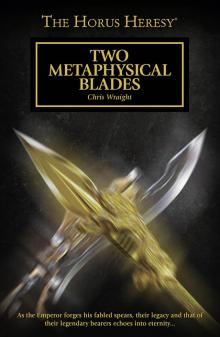 Two Metaphysical Blades
Two Metaphysical Blades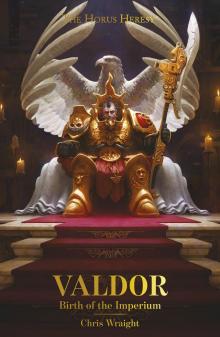 Valdor: Birth of the Imperium
Valdor: Birth of the Imperium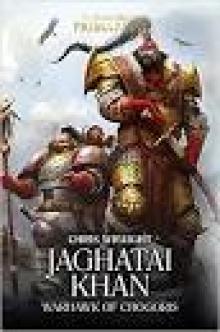 JAGHATAI KHAN WARHAWK OF CHOGORIS
JAGHATAI KHAN WARHAWK OF CHOGORIS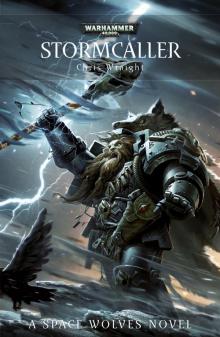 Stormcaller
Stormcaller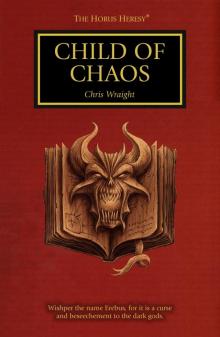 Child of Chaos
Child of Chaos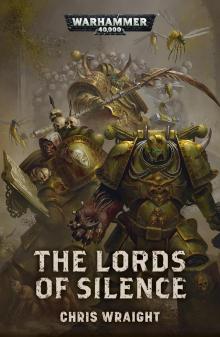 The Lords of Silence
The Lords of Silence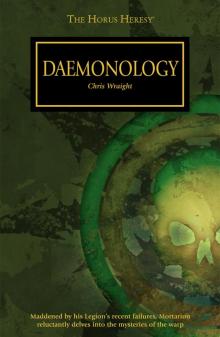 Daemonology
Daemonology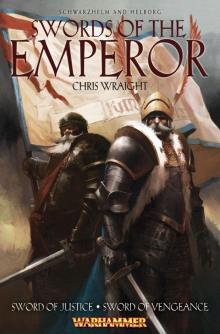 Swords of the Emperor
Swords of the Emperor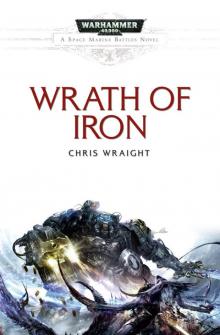 Wrath of Iron
Wrath of Iron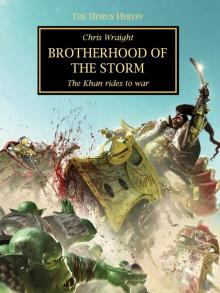 Brothers of the Storm
Brothers of the Storm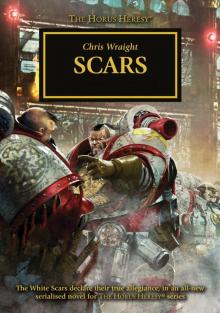 Horus Heresy: Scars
Horus Heresy: Scars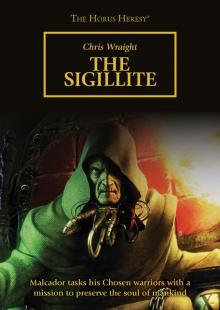 The Sigillite
The Sigillite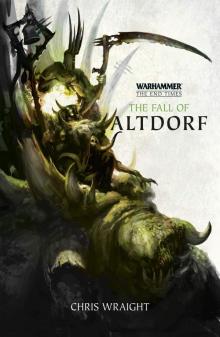 The End Times | The Fall of Altdorf
The End Times | The Fall of Altdorf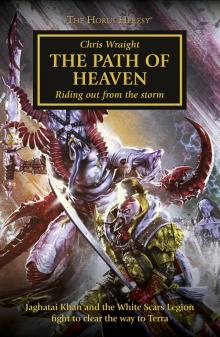 The Path of Heaven
The Path of Heaven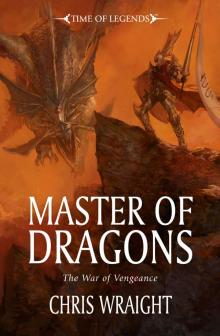 Master of Dragons
Master of Dragons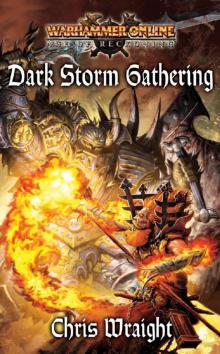 WH-Warhammer Online-Age of Reckoning 02(R)-Dark Storm Gathering
WH-Warhammer Online-Age of Reckoning 02(R)-Dark Storm Gathering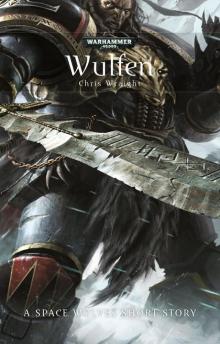 Wulfen
Wulfen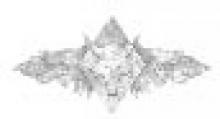 Battle Of The Fang
Battle Of The Fang Onyx
Onyx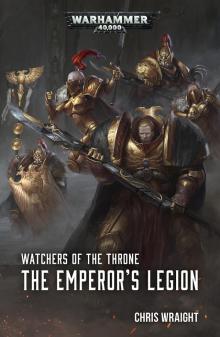 Watchers of the Throne: The Emperor’s Legion
Watchers of the Throne: The Emperor’s Legion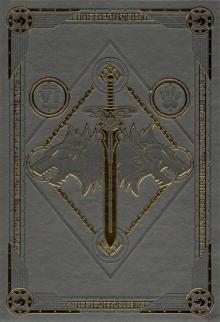 Leman Russ: The Great Wolf
Leman Russ: The Great Wolf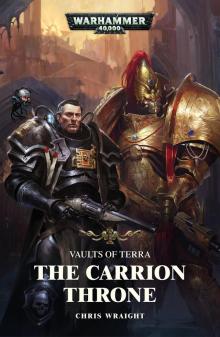 Vaults of Terra: The Carrion Throne
Vaults of Terra: The Carrion Throne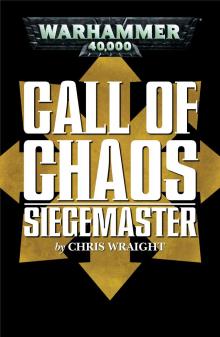 Siegemaster
Siegemaster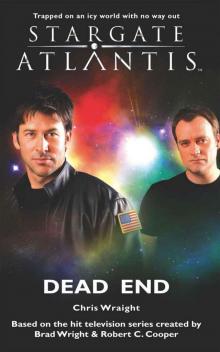 STARGATE ATLANTIS: Dead End
STARGATE ATLANTIS: Dead End Scars
Scars The Empire Omnibus
The Empire Omnibus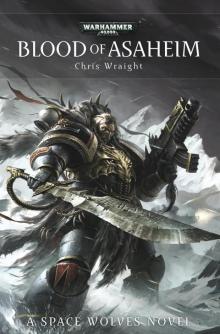 Blood of Asaheim
Blood of Asaheim